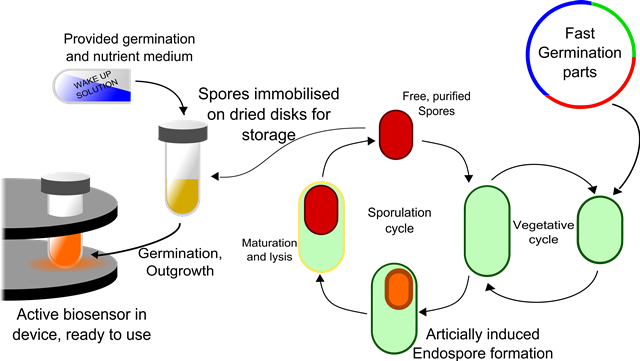Team:Cambridge/Project/Sporulation and Germination
From 2012.igem.org
(→References) |
|||
| (One intermediate revision not shown) | |||
| Line 28: | Line 28: | ||
We relied on the following works during the '' 'sporage and distribution' '' sub-project. | We relied on the following works during the '' 'sporage and distribution' '' sub-project. | ||
</span> | </span> | ||
| + | |||
<span style="color:#585858"> | <span style="color:#585858"> | ||
| Line 34: | Line 35: | ||
<span style="color:#585858"> | <span style="color:#585858"> | ||
| - | |||
'''Nicholson, W.L., and P.Setlow.''' 1990. Sporulation, germination and outgrowth, p.391-450. 'In' C.R.Harwood and S.M. Cutting (ed.), Molecular biological methods for ''Bacillus''. John Wiley and Sons, Chichester, United Kingdom. | '''Nicholson, W.L., and P.Setlow.''' 1990. Sporulation, germination and outgrowth, p.391-450. 'In' C.R.Harwood and S.M. Cutting (ed.), Molecular biological methods for ''Bacillus''. John Wiley and Sons, Chichester, United Kingdom. | ||
| + | |||
</span> | </span> | ||
| - | |||
| - | |||
| + | <span style="color:#585858"> | ||
The Fast Germination BioBrick was based on the construct used in: | The Fast Germination BioBrick was based on the construct used in: | ||
</span> | </span> | ||
<span style="color:#585858"> | <span style="color:#585858"> | ||
| - | |||
'''Wang, G., Yi, X., Li, Y.-Q., Setlow, P.''' Germination of individual Bacillus subtilis spores with alterations in the GerD and SpoVA proteins, which are important in spore germination(2011) J. Bacteriology, 193 (9), pp. 2301-2311. | '''Wang, G., Yi, X., Li, Y.-Q., Setlow, P.''' Germination of individual Bacillus subtilis spores with alterations in the GerD and SpoVA proteins, which are important in spore germination(2011) J. Bacteriology, 193 (9), pp. 2301-2311. | ||
</span> | </span> | ||
| - | |||
| - | |||
| + | <span style="color:#585858"> | ||
Details of design of the construct were found in: | Details of design of the construct were found in: | ||
</span> | </span> | ||
<span style="color:#585858"> | <span style="color:#585858"> | ||
| - | |||
'''Cabrera-Martinez, R.-M., F. Tovar-Rojo, V. R. Vepachedu, and P. Setlow.''' 2003. Effects of overexpression of nutrient receptors on germination of spores of ''Bacillus subtilis''. J. Bacteriol. 185:2457-2464. | '''Cabrera-Martinez, R.-M., F. Tovar-Rojo, V. R. Vepachedu, and P. Setlow.''' 2003. Effects of overexpression of nutrient receptors on germination of spores of ''Bacillus subtilis''. J. Bacteriol. 185:2457-2464. | ||
</span> | </span> | ||
<span style="color:#585858"> | <span style="color:#585858"> | ||
| - | |||
'''Paidhungat, M., and P. Setlow.''' 2001. Localization of a germinant receptor protein (GerBA) to the inner membrane of ''Bacillus subtilis'' spores. J. Bacteriol. 183:3982-3990. | '''Paidhungat, M., and P. Setlow.''' 2001. Localization of a germinant receptor protein (GerBA) to the inner membrane of ''Bacillus subtilis'' spores. J. Bacteriol. 183:3982-3990. | ||
</span> | </span> | ||
Latest revision as of 02:54, 27 September 2012


Sporage and Distribution
An issue with existing biosensors is the longevity of the chasses. E.coli has been a popular biosensor chassis to date, however cultures require regular maintenance, or cumbersome and energy intensive freezing processes. Long term distribution and hassle-free storage requires a more robust chassis.
Part of the main reason for choosing Bacillus subtilis as our chassis was because of it's abiltiy to form dormant spores. Tubes of the sporduino sporulated 'sensors' can sit in the user's cupboard, with a generous shelf life, until needed. When the user requires a specific sensor, the appropriate strain is selected and the bacteria can be germinated by following a simple protocol. The tube can then be placed into the arduino device, the test sample loaded and the concentration profile measured.
Sporage and Distribution aims to determine a procedure for inducing sporulation in Bacillus, and developing a very simple, user friendly and field worthy protocol for germinating the spores. It is essential for the germination procedure to be as straight forward as possible, requiring minimal equipment and expertise, so that it could in theory be performed in the field, in a situation where the biosensor might be used. For further information, refer to our Design process page and our Results page.
Germination is a time consuming event. The sooner germination and outgrowth is completed, the quicker the biosensing capability of the system can be implemented, which is the primary goal of sporduino.
There are several synthetic biology approaches that can be taken to speed up germination. One operon we investigated is the spoVA operon. Upon over expression of spoVA under the germination specific, sspB promoter, germination rates were improved. See the design page for more information about how this was accomplished.
References
We relied on the following works during the 'sporage and distribution' sub-project.
The Chemically Defined Sporulation Medium was from :
Nicholson, W.L., and P.Setlow. 1990. Sporulation, germination and outgrowth, p.391-450. 'In' C.R.Harwood and S.M. Cutting (ed.), Molecular biological methods for Bacillus. John Wiley and Sons, Chichester, United Kingdom.
The Fast Germination BioBrick was based on the construct used in:
Wang, G., Yi, X., Li, Y.-Q., Setlow, P. Germination of individual Bacillus subtilis spores with alterations in the GerD and SpoVA proteins, which are important in spore germination(2011) J. Bacteriology, 193 (9), pp. 2301-2311.
Details of design of the construct were found in:
Cabrera-Martinez, R.-M., F. Tovar-Rojo, V. R. Vepachedu, and P. Setlow. 2003. Effects of overexpression of nutrient receptors on germination of spores of Bacillus subtilis. J. Bacteriol. 185:2457-2464.
Paidhungat, M., and P. Setlow. 2001. Localization of a germinant receptor protein (GerBA) to the inner membrane of Bacillus subtilis spores. J. Bacteriol. 183:3982-3990.
 "
"
